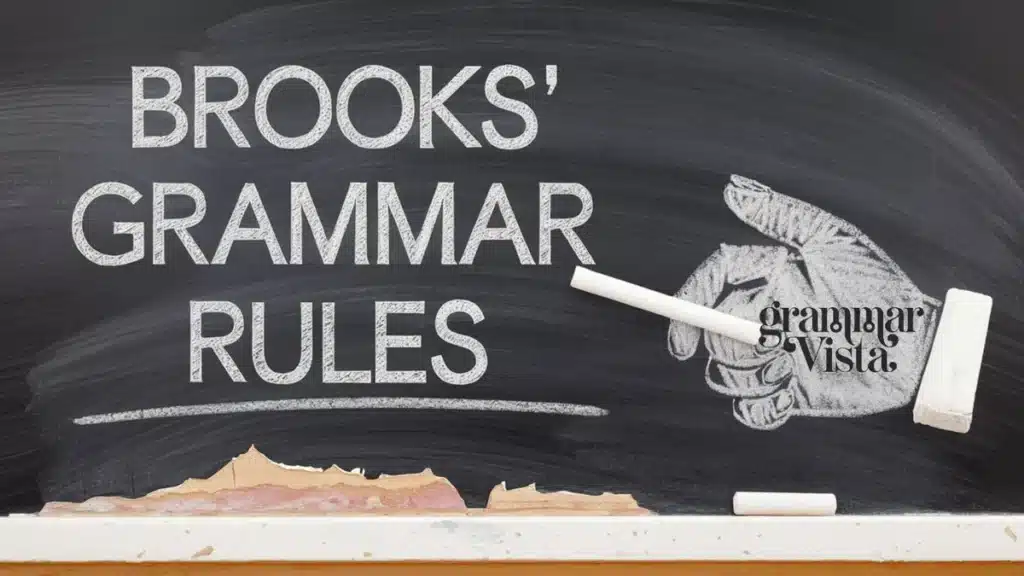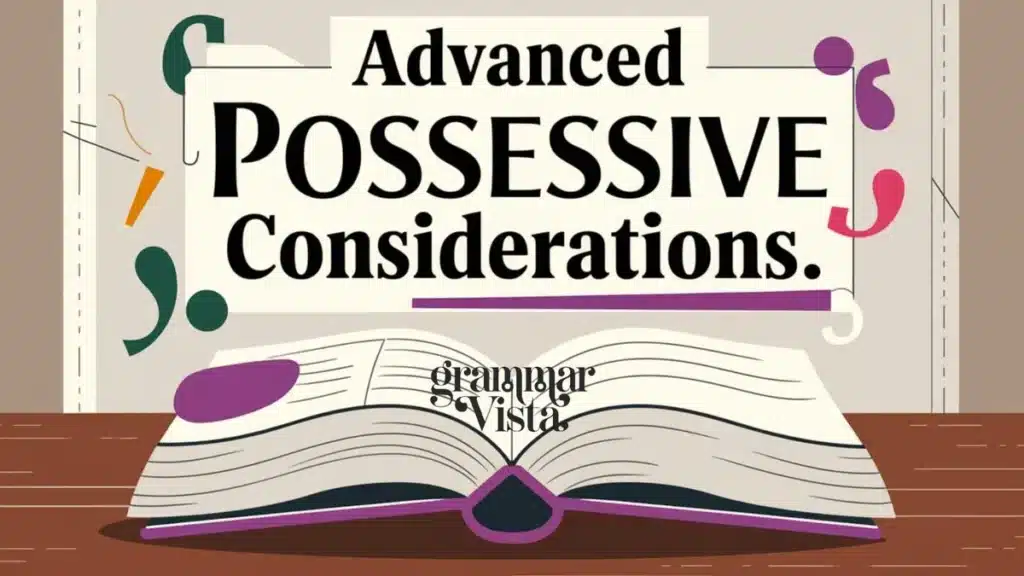Understanding whether to use “Brooks'” or “Brooks’s” is essential for clear writing and proper grammar. “Brooks’” typically denotes possession for names ending in “s,” while “Brooks’s” adds an extra “s” for clarity in certain styles. Mastering this distinction helps ensure your writing is precise and professional. In this guide, we will explore the rules and examples to help you confidently choose the correct possessive form.
As a language enthusiast, navigating the intricacies of possessive forms can be both fascinating and challenging. The seemingly simple question of whether to write Brooks’ or Brooks’s reveals the nuanced world of grammatical usage that often leaves even seasoned writers scratching their heads.
The Core of Possessive Formations
When it comes to Brooks possessive forms, writers encounter a grammatical puzzle that highlights the complexities of the English language. Unlike many straightforward grammatical rules, possessive formations involve multiple style guides and contextual considerations.
Singular Possessive: Breaking Down the Basics

Singular possessive forms typically follow a standard pattern. For most singular nouns, we add an apostrophe and an “s” to indicate ownership. In the case of Brooks, this means:
- Brooks’s book (follows standard singular possessive rule)
- Brooks’s car
- Brooks’s decision
Plural Possessive: A Subtle Difference

Plural possessive forms introduce additional complexity. When dealing with family names or surnames that already end in “s”, writers have some flexibility:
- Brooks’ family home
- Brooks’ tradition
- Brooks’ legacy
Style Guide Variations
Different style guides offer varying guidance:
APA Style Approach
In AP Style, the recommendation leans towards simplicity:
- Prefer Brooks’s for singular possessive
- Use minimal punctuation
- Prioritize readability
Chicago Manual of Style Perspective
The Chicago Manual of Style provides a more nuanced approach:
- Recommends Brooks’s for most singular possessive cases
- Allows Brooks’ for classical and biblical names
- Emphasizes consistency within a document
Read More about Business’ or Business’s?
Real-World Scenarios in English-speaking countries
Consider these practical examples from the Brooks family context:
- Singular ownership scenario:
- “John Brooks’s research revolutionized the field.”
- Here, the possessive clearly indicates John Brooks’s specific contribution.
- Multiple Brooks scenario:
- “The Brooks’ annual reunion brings together generations.”
- This suggests the collective ownership of multiple Brooks family members.
Linguistic Nuances and Exceptions

Pronunciation Matters
Some style guides recommend basing the possessive form on pronunciation:
- If you naturally say “Brookses”, use Brooks’s
- If it sounds awkward, consider Brooks’
Professional Writing and Brookes Possessive Considerations
In professional contexts, grammatical usage becomes critical. Writers must consider:
- Consistency
- Audience expectations
- Specific style guide requirements
Tips for Language Mastery
To navigate possessive forms confidently:
- Consult your preferred style guide
- Read widely
- Practice consistent application
- Listen to natural pronunciation
Common Mistakes to Avoid
- Don’t randomly switch between Brooks’s and Brooks’
- Always consider the specific context
- Remember that clarity trumps rigid rule-following
Practical Examples
| Scenario | Possessive Form | Explanation |
| Single Brooks | Brooks’s | Standard singular possessive |
| Multiple Brooks | Brooks’ | Plural possessive indication |
| Formal Writing | Brooks’s | Preferred in most style guides |
| Spoken Language | Varies | Depends on natural pronunciation |
By understanding these nuanced Brooks possessive forms, writers can confidently navigate the subtle landscape of grammatical ownership, ensuring their writing remains both precise and engaging.
Advanced Possessive Considerations: Beyond the Basics

Exploring Edge Cases in Possessive Formations
While we’ve covered the fundamental Brooks possessive forms, several advanced scenarios demand deeper exploration. Language mastery requires understanding the subtle intricacies that go beyond standard rules.
Proper Noun Complexities
Names Ending in “S”
Names like Brooks present unique challenges. Consider these complex scenarios:
- Single-syllable names:
- James’s car
- Chris’s book
- Charles’s research
- Multi-syllable names:
- Jameson’s invention
- Williams’s theory
- Nicholas’s proposal
You might be interested in Artist’s, Artists’, and Artists
Cultural and Regional Variations
English-speaking countries demonstrate fascinating variations in possessive usage:
- American English: Tends to prefer Brooks’s
- British English: More flexible with Brooks’
- Australian English: Often follows British conventions
Pronunciation-Driven Possessives
Linguistic experts suggest a pronunciation-based approach:
- If the name sounds natural with an additional “s” sound: Brooks’s
- If adding “s” creates an awkward pronunciation: Brooks’
Professional Writing Guidelines
Academic Writing Considerations
- Chicago Manual of Style: Recommends Brooks’s
- APA Style: Prefers Brooks’s
- MLA Style: Allows both, emphasizing consistency
Technological and Digital Age Implications
Grammatical usage continues to evolve with digital communication:
- Social media often simplifies possessive forms
- Digital style guides become more flexible
- Autocorrect and grammar tools offer inconsistent suggestions
Specialized Scenarios
Corporate and Brand Names
- Apple’s innovation
- Brooks’s marketing strategy
- Nike’s design
Family and Generational Context
- Brooks family naming conventions
- Generational possessive indicators
- Hereditary name ownership
Linguistic Exceptions and Irregularities

Classical and Biblical Names
Some style guides offer unique exceptions:
- Jesus’ teachings
- Moses’ commandments
- Achilles’ heel
Advanced Grammatical Strategies
Compound Possessives
- John and Mary Brooks’s house
- The Brooks and Smith’s joint venture
- Multiple ownership scenarios
Digital Age Language Evolution
Brookes possessive forms reflect broader linguistic trends:
- Increasing flexibility
- Context-driven rules
- Prioritizing communication over strict grammatical adherence
Technological Influence on Grammar
- Grammar checking tools
- AI-driven language suggestions
- Evolving style guide recommendations
Read More grammar lessons on GrammarVista
Practical Decision-Making Framework

When encountering possessive challenges:
- Identify the specific context
- Consult your preferred style guide
- Consider pronunciation
- Maintain consistency
- Prioritize clarity
Interactive Possessive Flowchart
Is the name singular?
|
├── Yes
│ ├── Ends in “s”?
│ │ ├── Yes → Consider pronunciation
│ │ │ ├── Sounds natural with “s” → Brooks’s
│ │ │ └── Awkward pronunciation → Brooks’
│ │ └── No → Standard possessive (Name’s)
└── No
├── Multiple owners?
│ ├── Yes → Brooks’
│ └── No → Compound possessive rules apply
Professional Writing Recommendations
- Maintain style guide consistency
- Consider audience expectations
- Be aware of regional variations
- Prioritize clear communication







